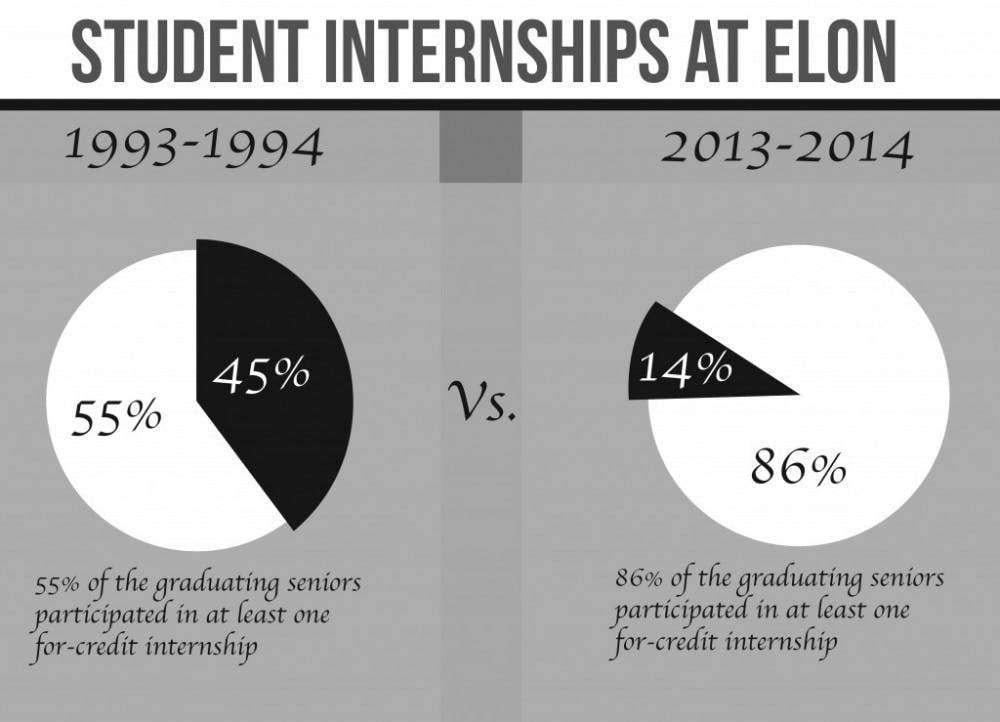The number of Elon students completing internships or co-ops has significantly increased over time, though there have been some growing pains.
According to the Elon Career Center, 55 percent of graduating seniors from 1993-94 participated in at least one for-credit internship or co-op. In comparison, 86 percent of 2013-14 seniors participated in at least one for-credit internship or co-op. From summer 2013-spring 2014, 1,206 students took on a for-credit internship.
Jasmine Turner, an internship ambassador for the School of Communications, goes to different classes to share her internship experiences with underclassmen. After securing an internship in the smaller Winston-Salem market, she interned in Washington, D.C. for a local television station and then went to New York City to intern for “60 Minutes.”
“Elon does a really good job of making sure that you can have a well-rounded experience if that’s what you’re seeking out, and you don’t have to intern in the same type of places for three summers,” Turner said. “My internships have really helped me hone in on what I want to do.”
Bringing employers and students together
In an effort to increase student engagement with employers and retain employers’ interests in returning to campus, Debby Wall, Elon University’s director of internships, is encouraging students to take advantage of new resources.
With the creation of Elon Career Fair Plus, a free app designed to simplify the process of preparing for job and internship expos, Wall hopes to see more students attend the upcoming expo on Thursday, March 12 than ever before.
“I can walk around with [the app], look at every company at the fair, click on it and it’s going to tell me about the company, who they’re recruiting for and even take a note,” Wall said.
While the app is designed for students, there is an overarching goal to make more companies return to Elon.
Employers struggle to find value in taking the time to post their available jobs when students do not use or are not aware of existing resources like the Elon Job Network.
“When employers aren’t hearing from students after they take the time to post, they’re going to move onto Duke [University] and they’re going to move onto Wake Forest [University],” Wall said. “They really wanted Elon. That’s why they came here.”
Internships difficult to obtain for some
The process for receiving internship credit can be difficult for some students depending on their major.
While a business major, with the exception of an economics and international economics major, and a communications major both require a for-credit internship to graduate, the process for receiving credit is quite different.
Jan Pagoria, Elon’s director of internships in the Love School of Business, said the business school has no restrictions on when students can get credit for their internship experience.
“Certain departments have that [class requirements needed before receiving credit], but we don’t in the school of business,” Pagoria said. “I support the fact that we don’t.”
In the School of Communications, freshmen are unable to receive internship credit because students majoring within this department must take Communications in a Global Age, Media Writing, Web and Mobile Communications and Creating Multimedia Content before applying for credit. Since Web and Mobile Communications and Creating Multimedia Content have a prerequisite of a C or better in Communications in a Global Age, the earliest a student could be eligible to receive credit is after the spring semester of his or her first year at Elon.
The purpose of this process for communications majors is to ensure they are prepared for their internship by the time they enter the work force. Pagoria believes a less restrictive process for receiving credit is more beneficial to students.
According to Pagoria, students who are able to secure a for-credit internship at a younger age have the advantage of getting a better idea of their future career path. Nagatha Tonkins, the director of internships in the school of communications, urges students to seek valuable work experience even if they cannot receive credit for doing so.
All students, regardless of major, must pay $450 per internship credit if they choose to receive credit over the summer. Since 18 credits are included in semester tuition, an internship taking up a 19th credit would cost an additional $900.
The Student Professional Development Center’s web page recommends students “begin thinking about an internship during their sophomore year.” Because an internship is a regular course for credit monitored by faculty with a letter grade, regular tuition charges apply.


